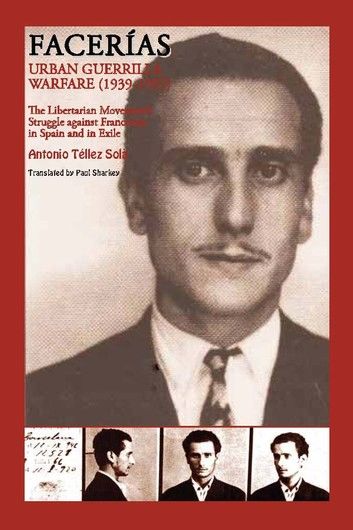| FindBook |
有 1 項符合
FACERÍAS Urban Guerrilla Warfare (1939-1957).的圖書 |
 |
FACERÍAS Urban Guerrilla Warfare (1939-1957). 作者:Antonio Téllez 出版社:ChristieBooks 出版日期:2014-10-05 語言:英文 |
| 圖書館借閱 |
| 國家圖書館 | 全國圖書書目資訊網 | 國立公共資訊圖書館 | 電子書服務平台 | MetaCat 跨館整合查詢 |
| 臺北市立圖書館 | 新北市立圖書館 | 基隆市公共圖書館 | 桃園市立圖書館 | 新竹縣公共圖書館 |
| 苗栗縣立圖書館 | 臺中市立圖書館 | 彰化縣公共圖書館 | 南投縣文化局 | 雲林縣公共圖書館 |
| 嘉義縣圖書館 | 臺南市立圖書館 | 高雄市立圖書館 | 屏東縣公共圖書館 | 宜蘭縣公共圖書館 |
| 花蓮縣文化局 | 臺東縣文化處 |
|
|
BARCELONA, Friday, 30 August 1957, 10:45 am. In the deserted Sant Andreu district of Barcelona, a burst of automatic gunfire crackles and, as if pushed by some mighty hand, a man on the corner of the Paseo Verdún and the Calle del Doctor Pi i Molist slumps against a low wall. A pistol appears in his hand. His eyes scan the tree-lined boulevard leading off to his right towards the Santa Cruz mental clinic, but he sees no sign of life. Suddenly, he realises he has been betrayed. Unseen assailants are shooting at him from windows overlooking the junction of the Paseo Urrutia and Calle del Doctor Pi i Molist. The first burst of gunfire shatters the man’s ankle. Further rifle shots ring out and bullets ricochet all around him . . .
Facerías was born in Barcelona on 6 January 1920. When the Spanish army mutinied in July 1936, Face, a member of the Woodworkers’ Union of the Confederación Nacional del Trabajo (CNT) and of the ‘Faros’ Libertarian Youth, promptly enlisted in the Ascaso Column (the Popular Front’s 28th Division) and joined the militia columns fighting against the fascist uprising on the Aragón front. Two and a half years later, in the last stages of the fighting in Catalonia, Facerías was taken prisoner and passed through a number of concentration camps and labour battalions. On his release, in late 1945, Face rejoined the underground CNT’s Printing Trades Union, and devoted all his spare time —and some of his working hours — to clandestine activities. From March 1946 onwards he became the driving force behind the union confederation’s Defence Groups in Barcelona’s central district. In July 1947, after a brief period of imprisonment, he formed his urban guerrilla group and launched the first of many major actions: armed robberies at the Hispano-Olivetti factory and the Spanish Credit Bank in the Calle Mallorca, a robbery which netted the union over 400,000 pesetas. Facerias believed that armed struggle was the fastest way to obtain money to support the union, its gaoled members and their desperately needy families.
The published and unpublished output of the author of this book, Antonio Telléz (1921-2005), was phenomenal, covering the period from Franco’s victory on 1 April 1939 to his death on 20 November 1975 — and beyond. Telléz had one main objective: to record the lives of selfless men who refused to compromise their ideals or treat with a system they found villainous and vile, men who devoted their adult lives to freeing Spain from the last of the Axis dictators. His work has made a major contribution to the movement for the recovery of historical memory which is now playing such an important part in contemporary Spanish politics.
|









